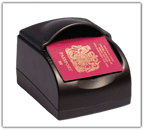Mobile ePassport on horizon as physical issuance hits tipping point
17 October, 2017
category: Biometrics, Contactless, Government, Transit
As physical electronic passports reach their tipping point, it appears that the mobile ePassport is among the next suite of innovations. Solid evidence of these and other advancements comes from Gemalto — a company with a clear view of the trend.
With 120 out of 190 countries issuing ePassports, adoption has reached over 60 percent—a clear tipping point
Europe-based Gemalto said earlier this month that it had issued ePassports in some 30 countries. “With 120 out of 190 countries issuing ePassports, adoption has reached over 60 percent—a clear tipping point,” says Tauri Cox, Gemalto marketing coordinator for North America. “But there are still plenty of new opportunities with both small and large countries. In addition, more and more national authorities are asking for end-to-end turnkey solutions instead of single components, showing the continued growth still poised in the industry.”
ePassport benefits
Countries that have yet to deploy electronic passports will face challenges that come from the absence of those secure travel documents. “Countries without ePassports are certainly challenged from a security perspective and will need to implement stronger border control, more secure visas, document authentication, etc,” Cox says. “ICAO’s TRIP initiative is encouraging these countries to see passport issuance as a global whole where each link in the security chain is key: obviously the passport itself but also enrolment, delivery, and control.” The Trip program—it stands for Traveler Identification Program—encourages countries to tie together such elements as interoperable applications, document control and inspection systems to help secure and authenticate travel documents.
Look for launch of mobile identity credentials within handsets – aka mobile ePassports – that store data and act as a companion to the traditional passport
Cox declines to detail the return-on-investment of ePassports and the security they offer as they continue to spread—she says national security cannot be quantified—but she did offer specific benefits that follow the deployment of the secure travel documents. “For instance, when the ePassport was adopted in Peru, citizens immediately obtained visa-free travel to Europe, which was good for freedom of movement and good for the travel and tourist business,” she says. “ePassports have enabled automation at borders for the convenience of travelers whilst maintaining security as they provide a trusted credential directly from the chip which can be used to biometrically verify the traveler at electronic border gates. And ePassports have also enabled efficient plane boarding with the use of the document with electronic boarding gates.”
Mobile ePassports among advances on horizon
Future ePassports will digitally store eVisas as well as entry and exit stamps to enable more efficient immigration control. Gemalto laid out other key trends in ePassport evolution including the next generation mobile ePassport and more:
- The continued inclusion of tamper-proof polycarbonate data pages to add longevity and reduce fraud.
- Launch of mobile identity credentials within handsets – aka the mobile ePassport – that store data and act as a companion to the traditional passport.
- Smart border and smart airport technology proliferates to read ePassports and biometrics to expedite travel.
Gemalto has helped develop ePassports in Algeria, Denmark, Finland, France, Hong Kong, Italy, Korea, Morocco, Peru, Portugal, Norway, Singapore, Sweden and the USA.



